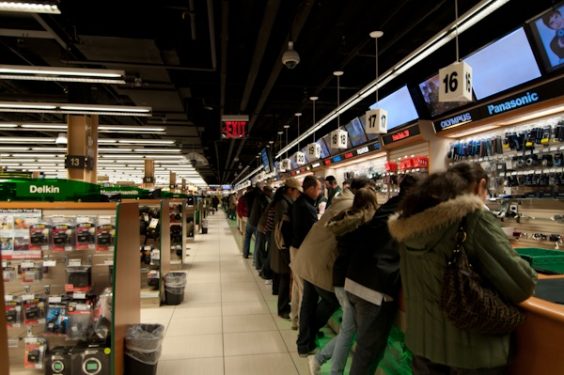Just when you think you’ve figured out how you’re going to be taxed on an item you purchased with a coupon or rebate, along comes a legal dispute that calls into question one state’s interpretation of its own tax laws, and a retailer’s effort to provide savings for its customers – and itself.
Now unless you happen to shop at the independent electronics and camera store in Midtown Manhattan that’s at the center of this dispute, the outcome is unlikely to affect you directly. But it could impact how and whether your own state ends up charging you sales tax on the full price of items you bought at a discount.
The owner of the B&H Photo Video Electronics store has come out swinging in response to a lawsuit filed against it late last year by the New York Attorney General’s office. The lawsuit claimed that B&H has failed for years to charge or remit sales tax for manufacturer-funded discounts, and owes the state about $7.3 million in back taxes. But B&H accuses the state of displaying a “lack of understanding of sales tax law.”
And it all seems to come down to whether the savings offered to customers come in the form of a discount, or a rebate.
In most states, including New York, the law is clear when it comes to coupons. Store coupons reduce your taxable total, but manufacturer’s coupons don’t. It gets a little more complicated when manufacturers provide a discount to retailers, who then pass along that discount to shoppers in the form of a store coupon – manufacturer-funded store coupons are subject to sales tax in the same way that manufacturer’s coupons are. The same applies to manufacturer-funded rebates.
“The tax rules concerning these arrangements have been clear for decades,” the New York Attorney General’s lawsuit reads. In the case of a manufacturer’s coupon, the retailer is paid in part by the shopper and in part by the manufacturer – therefore, the combined amount is considered the taxable selling price. In the case of a rebate, while the shopper applies for a discount directly from the manufacturer, they pay the full price up front to the retailer. So that’s considered the selling price for sales tax purposes.
But what about an “instant rebate” that’s given to a shopper on the spot?
At issue in this dispute is what B&H calls “Instant Savings.” The state calls it a rebate that “reduces the actual cost of the item to the customer,” but since B&H is reimbursed by the manufacturer, “sales tax is not limited to the discounted price, but is due on the amount ultimately paid by the customer plus the amount ultimately paid by the manufacturer.”
In a newly-filed response to the Attorney General’s lawsuit, however, B&H describes Instant Savings as “a reduction to the wholesale price that a manufacturer provides to a retailer to incentivize the retailer to put an item on sale.” It’s not a coupon, and it’s not even really a rebate – it’s essentially just putting an item on sale. By the state’s logic, B&H says, if a $100 item is on sale for $80, the customer should be charged sales tax on the original $100 selling price. “This defies not only common sense, but New York law,” B&H argues.
Consider that any time something goes on sale at your local grocery store, it’s likely because the manufacturer offered a price discount or other incentive to the retailer, who then passes along that discount to its customers to help boost demand for the product. It’s good for the manufacturer, good for the retailer, good for the customer – and perhaps not as good for the state, who gets less revenue from sales tax because only the actual purchase price, and not the regular full price, of the item is taxed.
B&H says its Instant Savings should be treated no differently. “Demonstrating their lack of understanding of sales tax law, the AG tries to equate Instant Savings with manufacturer’s coupons,” B&H argues. Because Instant Savings “are a retailer’s discount on the wholesale price of the product and are unaffected by a customer’s actions,” they are “nothing more than a storewide sale on specific items and not subject to tax.”
By the state’s logic, according to B&H, any manufacturer-funded discount should be subject to sales tax. If that logic were to be applied to supermarket shoppers, for example, you’d be paying sales tax on the full price of just about everything you buy, regardless of whether it’s on sale and regardless of whether you use any coupons at all.
“Taxing items on sale at their pre-markdown price is not industry practice, as every customer knows,” B&H’s argument concludes. The retailer is asking for the state’s case to be dismissed. This dispute is just the latest in a long line of lawsuits involving complicated arguments about sales tax, coupons and rebates. It’s now up to the judge to decide whether this case comes to a conclusion that’s just as murky as the others.
Image source: B&H Photo Video















Sorry, error in case number 2. It should say that the store gets $540 and passes $40 to the NY State Department of Taxation.
I am astounded at the level of misdirection concerning this issue.
There is only one question that needs to be answered. Just one question. And here it is:
How much money does the store receive from selling a camera? Whatever that is, it needs to be taxed.
Take the following examples:
1) I walk into a store. There’s a $1,000 camera, but it’s on sale for $500. I buy it. I pay $500. The store gets $500. I pay, say, 8% tax. The store gets the $40, and passes it on to the NY State Department of Taxation. Any problems with that? No? Let’s move on.
2) I walk into a store. There’s a $1,000 camera, but the store gives me an “instant coupon” for $500. I give the store $500. I pay, say, 8% tax. The store gets the $1,080, and passes $80 on to the NY State Department of Taxation. Any problems with that? No? Let’s move on.
3) I walk into a store. There’s a $1,000 camera. It’s not on sale. It costs $1,000. I only have $500. I start walking out of the store. But before I exit, Joe Shmo says “No problem. I’ll give the store $580, and with your $500, that should take care of it.” So, I give the store $500, Mr. Shmo gives the store $580. The store gets $1,800, and passes $80 on to the NY State Department of Taxation. Any problems with that? No? Let’s move on.
4) Business not doing so great at the store for Konicanon cameras. Konicanon say to the store, “Hey listen up. Nobody’s buying our camera for $1,000. Tell you what. You sell it to the customer for $500, and we’ll make it up to you. Either we’ll give you $500, or we’ll take $500 off your next purchase from Konicanon. How does that sound?
Store says “ok.” Store now advertises this $1,000 camera for $500. Customer walks into store. Customer pays $500 plus $40 tax. Gets camera. Store gets $540 from customer. Store gets $500 from Konicanon. Store passes on $40 to NY State Department of Taxation. Not $80. Only $40.
But at the end of the day, store received compensation valued at $1,000. Half came from customer. Half came from Konicanon.
Now tell me how, conceptually, how case 4 is different from case 3? In both cases, the store got THE FULL $1,000 value of the camera. Why on earth should the store be able to avoid paying tax on the amount it got from Konicanon? It should pay the full $80 in tax, not just what it got from customer.
And then we have misdirection. We have people complaining and whining that the customer should not have to pay $80 on a $500 purchase. Ok. No problem. Let’s only make the customer pay $40 on a $500 purchase.
But just because the store got the FULL VALUE of the camera from Konicanon plus the customer, rather than only from the customer, or only from the customer and Mr. Shmo, that is NO REASON why the store should be able to avoid paying sales tax. The store and the manufacturer came up with this side way of paying. So the store should eat the extra $40 in tax that the customer is not giving.
I’m with the retailer on this one. That’s how sales work. The manufacturer sells the item to the store for much cheaper than usual, and the store than offers that item for sale at a lower price than it regularly is. Boo the on the state. How is that fair to the consumer if they have to pay sales tax on the usual regular selling price and not the sale price of the item, as it is scanned?
Pingback: Should we be taxed on instant savings? - deranged.mederanged.me